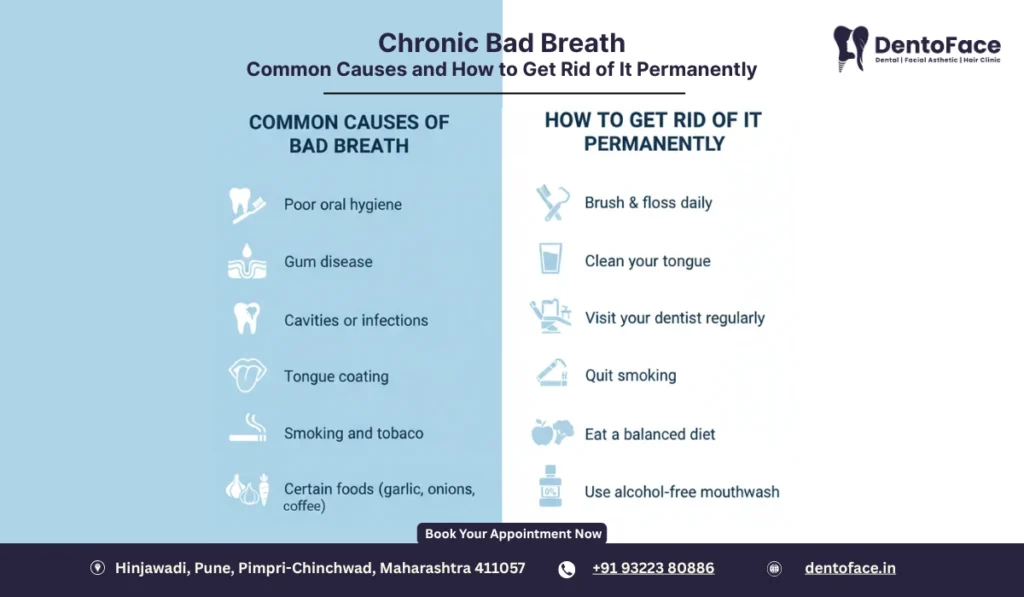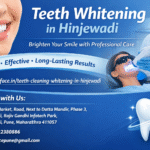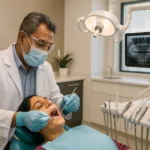Persistent bad breath, also known as chronic halitosis, is more than just a social inconvenience—it can indicate underlying dental or health issues that need professional attention. While occasional bad breath is common after eating certain foods or waking up in the morning, chronic bad breath lingers throughout the day despite brushing, mouthwash, or mints.
At Dentoface, a leading dental clinic in Hinjewadi Phase3, we frequently see patients struggling with persistent mouth odor that regular oral hygiene can’t fix. In most cases, the problem is linked to bacterial buildup, gum issues, or other oral conditions that require expert care.
If you’re someone who feels self-conscious about mouth odor or constantly worries about your breath, understanding the root causes and effective treatment options can help you regain confidence and maintain better oral health.
What Is Chronic Bad Breath?
Chronic bad breath, or halitosis, refers to a persistent unpleasant odor originating from the mouth. Unlike temporary odor caused by food or poor brushing, chronic bad breath often persists even after regular cleaning. The cause can stem from bacterial buildup, gum infections, or underlying medical conditions.
Identifying the exact cause is essential, as long-term bad breath can sometimes be an early sign of more serious oral issues like gum disease or tooth decay.
Common Causes of Chronic Bad Breath
1. Poor Oral Hygiene
The most frequent reason for bad breath is inadequate oral care. Food particles left in the mouth promote bacterial growth, producing foul-smelling sulfur compounds. When brushing and flossing are not thorough, plaque and tartar accumulate, trapping odor-causing bacteria.
Regular brushing, flossing, and tongue cleaning can help, but professional cleaning at a trusted dental clinic in Hinjewadi ensures that hidden plaque and tartar are completely removed.
2. Gum Disease (Gingivitis and Periodontitis)
When plaque is not cleaned properly, it can lead to gum infection. Bacteria attack the gum tissues, releasing toxins and causing inflammation. As gum disease progresses, pockets form between the gums and teeth, harboring odor-producing bacteria.
If your bad breath is accompanied by bleeding gums, loose teeth, or gum swelling, it may indicate a periodontal issue requiring immediate dental attention.
3. Dry Mouth (Xerostomia)
Saliva plays a crucial role in cleansing the mouth by washing away food debris and bacteria. When saliva production decreases—often due to dehydration, medication, or mouth breathing—the bacteria multiply, causing persistent bad breath.
Drinking plenty of water and avoiding caffeine, alcohol, and tobacco can help maintain saliva flow. In some cases, your dentist in Hinjewadi may recommend saliva substitutes or special mouth rinses to manage dryness.
4. Dental Cavities and Infections
Tooth decay, abscesses, or infected dental fillings can trap bacteria and food debris inside small openings, causing a strong odor. These bacterial colonies release sulfur gases that lead to chronic bad breath. Regular dental check-ups and timely fillings or root canal treatments can prevent such problems.
5. Tongue Coating
The tongue’s surface can collect bacteria, dead cells, and leftover food particles. This buildup appears as a white or yellow coating, which often contributes to mouth odor. Using a tongue scraper daily can significantly reduce this issue.
6. Food and Lifestyle Choices
Certain foods—such as onions, garlic, spicy dishes, and coffee—can cause temporary bad breath. Additionally, smoking and chewing tobacco are among the most common culprits of persistent oral odor. The smoke residue and nicotine stick to oral tissues, promoting bacterial growth and reducing saliva flow.
Limiting these habits can make a noticeable difference in the freshness of your breath.
7. Medical Conditions
In some cases, chronic bad breath is not solely an oral problem. Conditions such as sinus infections, tonsil stones, acid reflux (GERD), diabetes, and kidney or liver disorders can also lead to halitosis. If bad breath persists despite good dental hygiene, it’s important to consult both your dentist and physician.
How to Get Rid of Bad Breath Permanently
Now that you know the major causes, let’s discuss how you can eliminate bad breath effectively and permanently.
1. Practice Consistent Oral Hygiene
Brush your teeth at least twice a day using fluoride toothpaste. Don’t forget to floss to remove food particles from between your teeth. Cleaning your tongue daily is equally important, as bacteria often accumulate there.
2. Stay Hydrated
Drink sufficient water throughout the day to keep your mouth moist. Avoid sugary beverages, alcohol, and excessive caffeine, as these can dry out the mouth.
3. Schedule Regular Dental Cleanings
Even with daily brushing, some areas of your mouth are difficult to reach. Visiting a dental clinic in Hinjewadi for professional cleaning every six months ensures the removal of tartar, plaque, and bacteria that brushing alone can’t eliminate. Regular cleanings also allow early detection of cavities, gum problems, and other causes of bad breath.
4. Treat Underlying Dental Issues
If your dentist detects cavities, gum infection, or tooth decay, timely treatment can stop the problem at its source. Procedures such as scaling, root planing, or fillings not only improve oral health but also prevent odor-causing bacteria from multiplying.
5. Avoid Tobacco and Smoking
Smoking not only dries your mouth but also coats your teeth and gums with harmful chemicals. Quitting tobacco can dramatically improve breath freshness and overall oral health.
6. Watch Your Diet
Avoid foods that leave strong odors and increase bacterial activity. Instead, include fiber-rich foods like fruits and vegetables that naturally cleanse your mouth. Chewing sugar-free gum can also stimulate saliva flow, keeping your mouth fresh between meals.
7. Use Alcohol-Free Mouthwash
Mouthwashes containing alcohol can dry out your mouth over time. Choose an alcohol-free, antibacterial mouthwash to neutralize odor and maintain a healthy oral environment.
8. Manage Medical Conditions
If dental causes are ruled out and bad breath persists, consult your healthcare provider. Treating sinus infections, acid reflux, or diabetes can often help resolve chronic halitosis from non-oral origins.
When to See a Dentist
Persistent bad breath is not something to ignore. If the problem continues for more than a few weeks despite good oral hygiene, it’s time to seek professional help. A thorough dental examination can identify gum infections, decay, or other issues causing odor.
Your dentist in Hinjewadi can design a personalized treatment plan—ranging from professional cleaning to specialized care for gum disease—to ensure long-term freshness and confidence.
Prevention Tips for Fresh Breath
- Brush twice daily using fluoride toothpaste.
- Floss once a day to remove hidden food debris.
- Use a tongue cleaner every morning.
- Stay hydrated and limit sugary drinks.
- Avoid smoking and alcohol.
- Get a dental check-up every six months.
- Maintain a balanced diet with fruits and vegetables.
Following these steps consistently helps prevent bad breath and promotes healthy gums and teeth.
Conclusion
Chronic bad breath can be frustrating, but it’s also treatable with the right dental care and lifestyle changes. The key is to identify the underlying cause and take proactive steps—both at home and with professional help.
Regular visits to an experienced dental professional ensure that oral problems like cavities, plaque buildup, or gum disease are addressed early.
If you’ve been struggling with persistent mouth odor, it’s time to visit your nearby dental expert for a comprehensive check-up and personalized treatment plan.
For advanced oral care and lasting freshness, trust the specialists at Dentoface – your reliable dental clinic in Hinjewadi.
Schedule your appointment today with an experienced dentist in Hinjewadi to restore confidence in your smile.
Read Here: Best Dental Clinic in Hinjewadi: Treatments, Costs & How to Choose the Right Dentist








